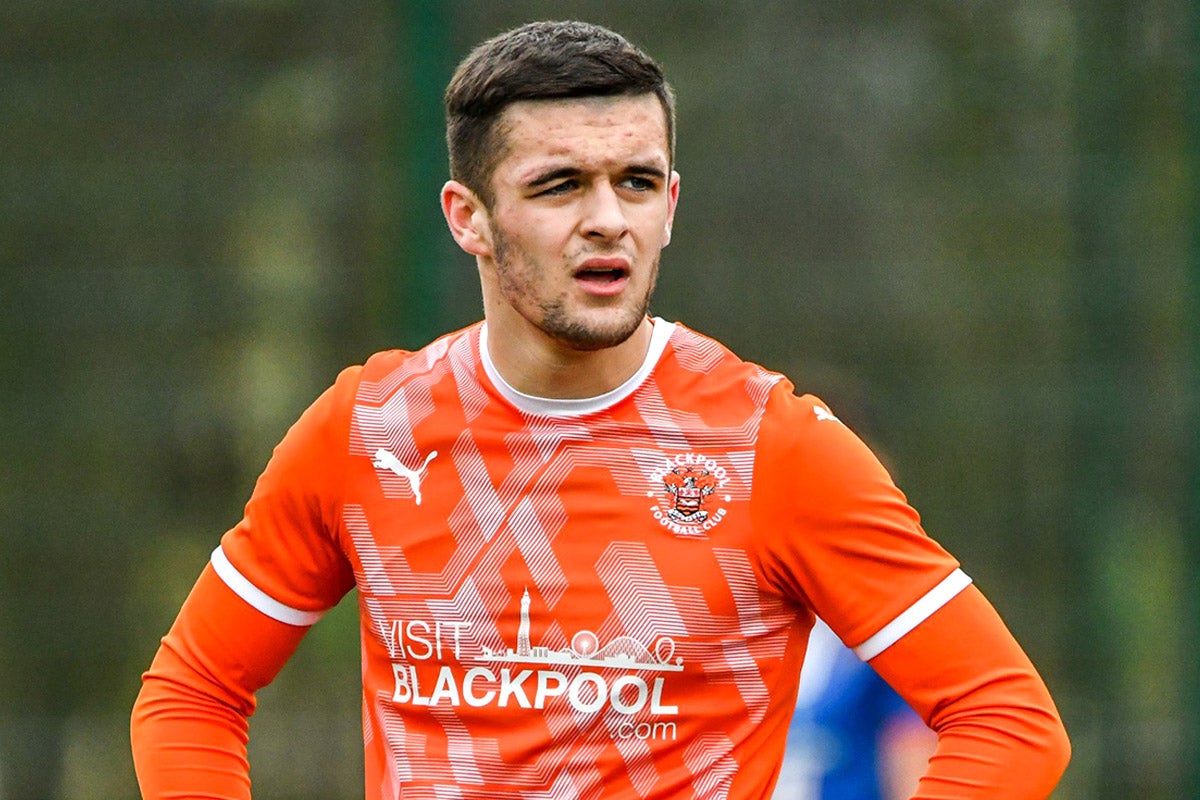I spoke to two gay men working at the top of male football – neither think their sexuality is important. Tell that to Jake Daniels
Daniels becoming the first openly gay professional player in 30 years should be rightly praised, but questions remain: namely, why has it taken so long?


Your support helps us to tell the story
From reproductive rights to climate change to Big Tech, The Independent is on the ground when the story is developing. Whether it's investigating the financials of Elon Musk's pro-Trump PAC or producing our latest documentary, 'The A Word', which shines a light on the American women fighting for reproductive rights, we know how important it is to parse out the facts from the messaging.
At such a critical moment in US history, we need reporters on the ground. Your donation allows us to keep sending journalists to speak to both sides of the story.
The Independent is trusted by Americans across the entire political spectrum. And unlike many other quality news outlets, we choose not to lock Americans out of our reporting and analysis with paywalls. We believe quality journalism should be available to everyone, paid for by those who can afford it.
Your support makes all the difference.Congratulations to Jake Daniels, the Blackpool FC player who has come out as gay aged 17, becoming the first active male player to come out at the top of the British male game since Justin Fashanu, who tragically took his own life in 1998.
Conversations have spiralled for decades about why male footballers haven’t come out when statistically there are obviously gay men playing – and by contrast, the women’s team is replete with “out” players.
Daniels becoming the first openly gay professional player in 30 years should be rightly praised, but questions remain: namely, why has it taken so long? In many ways, football feels like the last bastion of sexual intolerance; the last sport where you can’t say you’re gay, even though rugby, cricket and swimming have all had openly gay players for years.
And while not enough praise can be heaped on Daniels for coming out, the reality of the scale of representation at the top of the Premier League is woeful.
While football bodies send press releases saying football welcomes people from all minority groups, these good intentions are quite different from the reality – as I found from researching and trying to write about LGBT+ culture in football over a period of nine months. I learned that there are very slim levels of LGBT+ representation within the Premier League. Daniels’s example is overwhelmingly the exception, rather than the norm – and it seems harder to “come out” in football than in any other sport. But why?
As a queer writer, I know that both I and many others from minority backgrounds will be able to parrot this shared experience: if you don’t see yourself represented, and get buoyed by your peers who tell you everything’s going to be fine, how on earth can you build the confidence to come out?
Last year I attempted to write about why there weren’t any gay men at the top of the game, and the most interesting discovery I made was this: I found just two men working with the Premier League (not footballers, player care types) who were willing to disclose that they were gay.
Both men told me that they didn’t feel their sexualities mattered to their jobs as diversity and inclusion professionals – despite being the only two openly gay people working with top players that I could find.
Of course, it’s always everyone’s own decision whether they decide to come out or not. But some of us live and die by the importance of representation. From my own lived experience, it really is simple: if you don’t see yourself represented in life around you, by the people you surround yourself with; how can you develop the courage to live your life honestly?
As a 33-year-old, most of my friends have gleefully flocked to the home counties to buy houses – but my two queer housemates provide me with an alternative to the heteronormative family set up.
Put simply: I am not like those friends who have fled London – and spending my life surrounded by other queers makes me feel seen and able to be me. I dread to think what my life would be like without them.
I’ll say it again: Daniels is a hero for coming out, when very few people in the footballing world are positively celebrating the diversity of queer identities.
In the sweaty, banter-filled dressing rooms of football pitches, and during the highly intensified short-lived careers of footballers, who have often only three or four years at their peak (not to mention the unprecedented weight of expectation heaped on players), it’s clearly near impossible to find time or courage to carve out a space to say: “I’m gay. This matters.”
What footballers need – just like paramedics, soldiers, personal trainers or lawyers, and many more – is to see other gay and queer professionals to look up to; to show them the way.
People in the Premier League and elsewhere don’t seem to understand the importance of representation – and not just representation itself, but positive representation. The message that not only am I gay, but that being gay is an incredible part of me: something to celebrate, to shout high from the rooftops. We shouldn’t have to live the way previous generations had to live – in shame, stigma and fear for their own safety.
There are thousands of footballers in the upper echelons of the game who must be in desperate need of gay and queer role models as coaches, referees, players, managers, cleaners and in player care. It’s really as simple as proactively hiring more queer people who look and sound different to the norm. I’m sure the FA is doing their best to hire diversely, but more work needs to be done.
Studies back up my point about the importance of feeling seen: Nicole Martins of Indiana University has spoken about her study which strongly suggested that children watching TV shows felt good about themselves if they saw themselves represented. “There’s this body of research and a term known as ‘symbolic annihilation,’ which is the idea that if you don’t see people like you in the media you consume, you must somehow be unimportant,” she said.
To keep up to speed with all the latest opinions and comment sign up to our free weekly Voices Dispatches newsletter by clicking here
Student-led research has also shown that some students think that not seeing themselves represented can affect their mental health, and other studies about LGBT+ representation show how it can lead to LGBT+ people being more accepted by non-LGBT+ people.
So well done to Jake Daniels, who may not feel more represented on the pitch yet – but whose brave speech today to Sky News will no doubt encourage more footballers to follow suit, and fans too.
Perhaps his best football is to come, now that he’s able to really be himself. “The day after I told my mum and sister, we played Accrington [in an under-18s fixture] and I scored four goals, so it just shows how much of a weight off the shoulders and what a massive relief it was,” he told Sky.
Daniels is 17 – by the time he’s 27, thanks to his brave work, the landscape of football could look very different indeed. I hope it will be much more brilliantly, boldy queer. What’s more, footballers being able to be themselves might just get clubs climbing the rankings, too. It’s a win-win.
Join our commenting forum
Join thought-provoking conversations, follow other Independent readers and see their replies
Comments